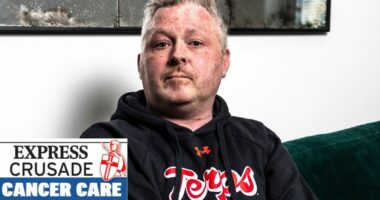Share this @internewscast.com
It was only by chance that Anneka Murphy discovered the awful truth. While at work one day, the primary school teacher from Wakefield, West Yorkshire, was accidentally pricked by the needle of a diabetic pupil’s insulin syringe.
Although she wasn’t overly concerned about the risk of infection, she visited her GP for precautionary blood tests.
But while the needle, as expected, had caused no harm, the doctor revealed the tests showed she was in the advanced stages of chronic kidney disease.
‘The news hit me like a bus,’ says Anneka. ‘It just didn’t make sense.’
Despite being in her 30s and showing no visible signs of ill-health, her kidneys were breaking down and failing to filter toxins from her blood.
Further tests after the shock diagnosis revealed she also had extremely high blood pressure – a common but often silent cause of kidney damage.

Despite being in her 30s and showing no visible signs of ill-health, Anneka’s kidneys were breaking down and failing to filter toxins from her blood
Within three years, Anneka’s kidneys had completely failed. She now spends 12 hours a week undergoing dialysis – a life-sustaining medical process that filters her blood. Her only chance at a normal life is a kidney transplant.
The now 39-year-old is calling for better testing to tackle a condition affecting millions, which often develops silently in its early stages. Convinced her illness could have been detected and treated far earlier, she is urging wider use of routine blood pressure checks – echoing warnings from experts last month of a worrying rise in high blood pressure, particularly among younger adults.
She is also backing demands for routine screening for kidney disease.
Anneka says: ‘In the years before the diagnosis, I had no signs of illness. It was only after I was diagnosed they said my blood pressure was sky high – which should have been a warning sign.
‘But I wasn’t checked. Like me, too many people don’t find out they have kidney disease until their condition has advanced.
‘We need to see more blood pressure testing and more screening, specifically for kidney disease.’
Her comments came as a study revealed early detection of chronic kidney disease could spare thousands from dialysis or transplants – and significantly cut the risk of life-threatening complications such as heart attack and stroke.
Chronic kidney disease occurs when the kidneys – which produce urine and remove waste products from the blood – don’t work as well as they should. It typically worsens over time and the damage cannot be reversed. An estimated 7.2 million Britons are affected – and the disease causes around 45,000 deaths every year. High blood pressure and diabetes are the most common causes – as well as kidney infections and long-term use of anti-inflammatory drugs.

Anneka says: ‘In the years before the diagnosis, I had no signs of illness. It was only after I was diagnosed they said my blood pressure was sky high – which should have been a warning sign’
As chronic kidney disease progresses, patients may experience fatigue, breathlessness, swollen ankles, feet or hands, and blood in the urine. In severe cases – affecting around 30,000 people in the UK – dialysis is needed to take over the job of the kidneys. Each year approximately 3,600 adults undergo a kidney transplant.
Even in the early stages, chronic kidney disease can be detected by blood and urine tests that show how the kidneys are working.
These are offered to high-risk patients, but Dr Navdeep Tangri, professor of medicine at the University of Manitoba in Canada, believes screening should become standard. He says: ‘Everyone over 45 and everyone with diabetes or high blood pressure should be screened for chronic kidney disease.
‘The tests are cheap and easy to do. And with medical advances over the past ten years, there are highly effective treatments available.’
Drugs were available in the past to treat potential causes of chronic kidney disease – such as medicines for lowering blood pressure or reducing cholesterol – but not the disease itself.
In recent years, however, a class of drugs called SGLT2 inhibitors have been found to dramatically slow the progression of kidney disease and reduce the risk of kidney failure.
As well as a daily tablet called empagliflozin, another drug, dapagliflozin, was last month approved for use on the NHS for kidney patients with type-2 diabetes.
And an analysis called Impact CKD, led by Dr Tangri, modelled the potential benefits over a 25-year period if standard screening was introduced, and if treatment was offered to three-quarters of those with the disease.
The study found a one-third reduction in the need for dialysis, as well as a £13.8 billion cumulative saving in costs linked to dialysis and transplant surgery.
It also suggested that early detection and treatment could reduce the number of kidney patients suffering heart attacks and heart failure by 45 per cent.
At the start of last year, Anneka – who lives with her husband Richard and their four children – was placed on the waiting list for a kidney transplant. Eight family members came forward to be donors, but none were compatible, and it could be years before a suitable organ becomes available.
Anneka, who is still working despite the disease, adds: ‘We all need to learn from cases like mine. Taking your blood pressure should be almost as regular as brushing your teeth.’
















